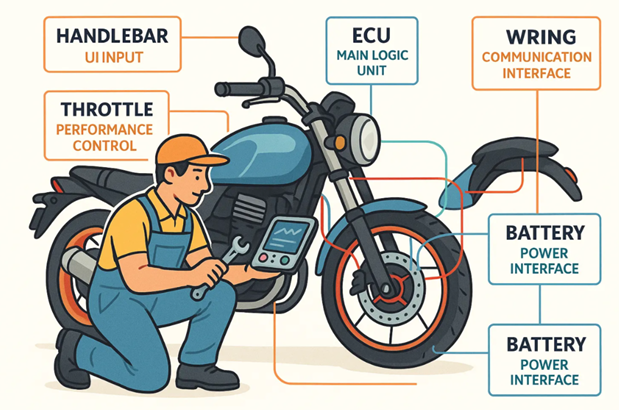The Bike That Taught Me How to Code Better 1
@Siddharth

Introduction
I used to think programming is about typing code. But the best programmers don’t just write instructions — they build systems that behave, adapt, and survive.
A Lesson from a Bike That Wouldn’t Start
When I went to my old town, my bike refused to start. I took it to a nearby mechanic. He didn’t open the engine. Instead,
▸ He pressed the horn → Nothing
▸ Then checked the battery wire → Loose
▸ One twist, one spark → Fixed
He didn’t guess. He diagnosed. That’s the first habit I noticed in experienced programmers. They ask:
▸ What changed?
▸ What’s connected to what?
▸ What is this thing responsible for?
🚫 Beginners Do:
Bike won’t start → Opens engine
Bug in code → Rewrites function
✅ Instead:
Check the battery wire.
Check inputs, states, logs
🧩 Thinking in Interfaces:
That mechanic didn’t know my bike. But he knew how bikes work. He treated the battery as a component. It should supply power. If it’s not connected, nothing works. That’s an interface mindset.
🧠 Inform 7 – The Language that Thinks Like the Real World
Some languages make this kind of thinking natural. Inform 7 is one of them. It models systems using relationships and rules. Instead of classes and structs, it gives you:
▸ Things (Objects)
▸ Rooms (Locations)
▸ Relations (Connections)
▸ Activities (Behaviors)
You describe your system like writing a story:
No boilerplate. No classes. Just relationships and behavior. You describe how the world works — and the code follows.
🧑💻 What If We Wrote This in Go?
In Go, we model the same behavior using structs and interfaces:
The bike doesn’t care about the battery’s internal design — just whether it’s connected. That’s interface-based design.
🖥️ How It Looks in JavaScript
JavaScript doesn’t have formal interfaces, but the pattern is the same:
This is called duck typing – If it behaves like a battery, it’s treated like one.
🔃 The Shift
The best programmers move:
▸ From writing code → to designing behavior
▸ From thinking in lines → to thinking in flows
▸ From depending on structure → to depending on contracts
They don’t just build features. They build systems that make sense — and don’t break when one part changes. Just like the mechanic – They know the real problem is often in the wire, not the engine.
Ready to discuss your project?
Let’s talk about your goals and how we can help bring them to life. Whether you're starting fresh or scaling fast, our team is here to support your digital journey — every step of the way.
